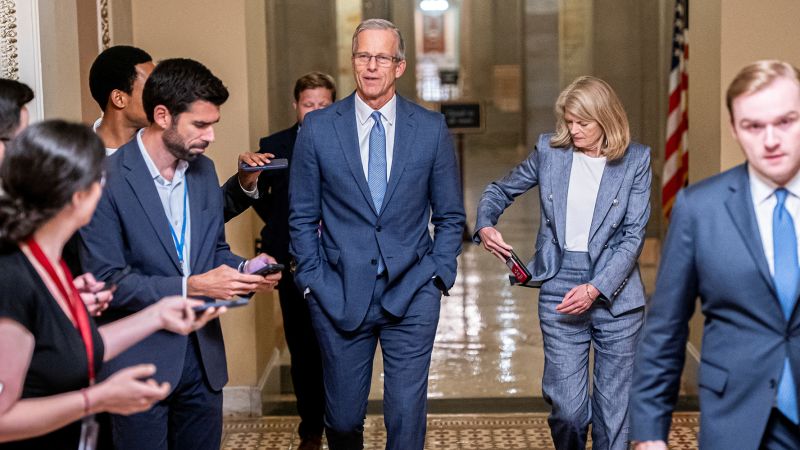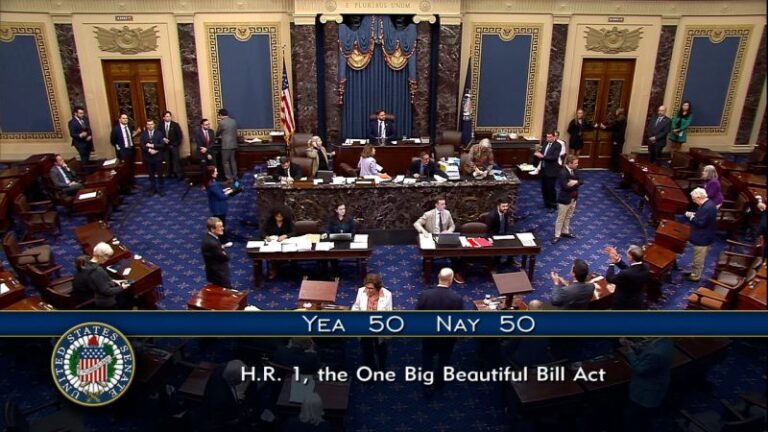Senate Republicans are rapidly advancing towards a decisive vote on President Donald Trump’s comprehensive agenda bill after enduring over 24 hours of intricate negotiations to secure crucial GOP backing. The legislation, which aims to reduce federal taxes and bolster funding for the Pentagon and border security while trimming government safety-net programs like Medicaid, is poised for a final set of votes. Senate Majority Leader John Thune expressed optimism on Tuesday morning, stating, “I believe we do,” when asked if a deal had been reached to proceed.
Vice President JD Vance, who arrived on Capitol Hill earlier that day, is anticipated to cast a tie-breaking vote on several pivotal amendments, including the extensive package of negotiated changes known as the “substitute” amendment. “We’ll need him on the actual substitute bill,” remarked Republican Sen. John Hoeven of North Dakota.
The Path to Agreement
The Senate GOP’s momentum follows a full day of intense discussions involving Thune, Vance, and GOP holdouts like Sen. Lisa Murkowski of Alaska. Vance has been instrumental in persuading Murkowski, a critical centrist, to support the significant tax and spending cuts package. GOP leaders have been diligently courting Murkowski with tailored policy incentives for Alaska, culminating in a tentative deal.
Murkowski indicated progress, stating, “It’s in the hands of the people that operate the copy machine,” suggesting the vote’s dependency on procedural formalities. Earlier, the Senate parliamentarian ruled that a food stamps-related provision, designed to appease Murkowski, could remain without violating budget rules, while a Medicaid cost-sharing change was deemed non-compliant.
Challenges and Frustrations
Despite the progress, the unprecedented session has tested the patience of both Republicans and Democrats. The Senate has been voting on amendments to Trump’s bill for a full day, a marathon effort that underscores the contentious nature of the legislation. The bill’s journey is not over yet, as it must pass the narrowly divided House, where many members harbor reservations.
House GOP leadership has been signaling to the Senate the preference for adopting the House’s version of the bill, rather than undertaking significant rewrites. Nevertheless, if the Senate approves its version, the House is expected to vote on it by Wednesday, according to a GOP leadership source.
Implications and Next Steps
The rapid turnaround presents a logistical challenge for House lawmakers, many of whom are dispersed across the country for the holiday recess. Yet, GOP sources remain confident in meeting the president’s end-of-week deadline. Thune and House Speaker Mike Johnson are working tirelessly to secure Trump’s first major legislative victory, aiming for a signing ceremony on the Fourth of July.
This legislative push represents a significant moment for the Trump administration, aligning with broader efforts to reshape federal priorities and reduce the size of government. The outcome of this vote could set the tone for future legislative endeavors and influence the political landscape as the administration seeks to solidify its policy agenda.
“I’m of Scandinavian heritage. Always a bit of a realist. So we’ll see what happens.” — Senate Majority Leader John Thune
As the Senate GOP races to conclude this record-breaking session, all eyes are on the final votes and the subsequent House decision, which will ultimately determine the fate of Trump’s ambitious legislative package.
























